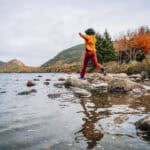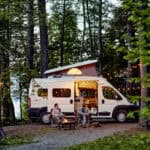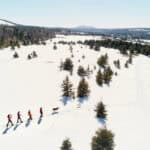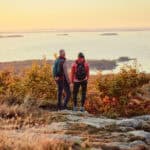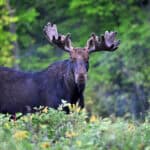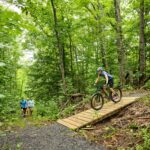Look Out for ME
A Shared Promise to Maine’s Outdoors
From its pine forests and pristine lakes to its rugged coastline and quiet coves, Maine’s wild beauty isn’t just something to see—it’s the quiet force that forges our very experiences and shared stories. Here, every adventure is made possible by a natural and cultural landscape that deserves our respect and care. That’s why we’re inviting you to Look Out for ME.
Rooted in decades of research and the 7 Principles of Leave No Trace, this initiative empowers you to be a good guest—on the trails, in small towns and everywhere in between.
By picking up after yourself, sticking to marked trails, supporting local businesses and honoring the culture of our lands, you help ensure Maine stays Maine—for today and for generations to come.
Wherever your journey leads, join us and Look Out for ME.
1. Know Before You Go
- Know the Rules and Be Prepared: Research local regulations, including permits and fire restrictions, on sites like Visit Maine. Pack plenty of food, water, and the other “Ten Essentials” before heading out on your adventure.
- Respect Private Land: Many landowners allow recreation on their land, but it’s up to you to confirm permission before entering.
- Recognize Working Forests and Waters: Maine’s landscapes are not just for recreation—they’re also active, productive environments that support local livelihoods and communities. Forests may be actively logged; waterways are used for lobstering, clamming, aquaculture, and transport. For everyone’s safety, maintain a safe distance from active logging operations, and do not disturb working docks, fishing equipment, traps or buoys.
- Plan for Changing Weather: Maine’s weather can turn fast—be weather wise and pack layers, rain gear and check the forecast before heading out.
- Be Prepared to Share the Space: Outdoor recreation in Maine welcomes everyone. Have an alternative plan in case the parking area is already full.
- Respect Group Limits: Smaller groups can reduce environmental impacts and preserve solitude.
- Seek Expert Advice: Registered Maine Guides and outfitters can help you safely explore places and activities you wouldn’t go on your own.
2. Travel and Camp on Durable Surfaces
- Stay On Designated Trails: Staying on the trail protects fragile plants, keeps you away from hazards like poison ivy and ticks, and helps avoid forestry equipment.
- Set Up Smart: Use established campsites to avoid damaging new areas.
- Avoid Trampling Fragile Areas: Vegetation and soils in Maine’s alpine zones and coastal islands can take years to recover from a single step.
- Respect Seasonal Closures: Avoid muddy trails to prevent lasting damage. If you have to pass through wet or muddy trails, walk down the middle of the trail to avoid widening the path and causing further damage.
3. Dispose of Waste Properly
- If You Pack It In, Pack It Out: Carry out all trash, including food scraps and biodegradable waste like fruit peels. Bonus points for packing out trash you find along the way.
- “Go” Before You Go: Use available restrooms before your adventure. And, if there’s no restroom, dig a 6-8 inch hole and bury waste at least 100 feet from trails and water.
- Adhere to Land Manager Recommendations: In some places, packing out all solid human waste using a WAG Bag is the best way to reduce soil and waterway contamination. Be sure to know the regulations before your adventure.
- Bag & Carry Pet Waste: Dog waste doesn’t belong in nature—pack it out and put it in the trash.
- Wash with Care: Use biodegradable soap at least 200 feet from water, disperse strained dishwater, and carry out food scraps to an available trash can.
4. Respect Maine Culture and Leave What You Find
- Learn about the Wabanaki Nations. Today, the four federally recognized tribes in Maine are the Houlton Band of Maliseet, Mi’kmaq Nation, Penobscot Nation, and Passamaquoddy Tribe, known collectively as the Wabanaki Nations and “People of the Dawnland.” Wabanaki people have inhabited the land we now call Maine since time immemorial. To learn more about Wabanaki Nations visit the Wabanaki Alliance.
- Respect Cultural Sites: Observe historic structures and artifacts but leave them untouched, and only visit areas open to guests. Taking or moving historical artifacts can erase some of our only records of that history.
- Please don’t disturb forestry equipment or coastal traps, buoys or gear. Maine’s working forests and waters are an active part of many Mainers’ livelihoods. It’s also a good idea to stay off docks unless invited.
- Take Only Pictures: Rocks, driftwood and plants provide habitat and nutrients.
- Don’t Disturb Rock Cairns: Those stacked rock formations? They mark the trail—don’t move or build new ones.
- Stop Invasive Species: Buy firewood locally, clean your boots and gear, and clean, drain and dry watercraft before and after visiting.
5. Minimize Campfire Impacts
- Follow Fire Restrictions: Maine’s dry seasons mean fire bans—always check first. If fires are permitted:
- Do you need a Recreational Fire Permit? Many areas of Maine will require you to have a permit for your campfire. Check here first to avoid issues later.
- Use Fire Rings: Only build fires in approved sites.
- Gather Small & Dead Wood: Protect Maine’s mighty forests – never cut branches or peel bark from live trees. If you’re bringing firewood, buy near where you will burn it.
- Use Water to Drown Your Fire: Fully extinguish fires with water before you leave.
- Consider Using a Stove: It’s safer, easier, and reduces impact. Lanterns and string lights make for great campsite ambiance instead of a campfire.
6. Respect Wildlife
- Watch From A Distance: Use binoculars or a zoom lens—getting too close will stress animals and be dangerous.
- Never Feed Wildlife: It can change their behavior and can make them dependent on humans.
- Protect Habitat: Stay out of nesting areas and keep pets leashed.
- Store Food Securely: Use animal-resistant containers to store your food.
- Be Aware of Seasons: Give extra space during breeding and migration times – be aware that some hiking and climbing areas are closed seasonally during nesting season.
7. Be Considerate of Others
- Travel Thoughtfully Through Maine’s Towns: Responsible visitation makes a difference in town, too. Some Maine communities have local norms for respectful visitors. Among other things, parking in designated spots is essential. Please also be respectful of pedestrians, cyclists and speed limits when in town.
- Yield to Others on Trails: Uphill hikers, equestrians, and working vehicles or equipment have the right of way.
- Keep It Quiet: Let nature be the soundtrack—avoid loud music and shouting.
- Pick Up After Pets: It’s a shared space—keep it clean.
- Be Courteous at Boat Launches and on the Water: Have patience at boat launches and make sure to share these public spaces. Give space to anglers, paddlers, and boaters, and remember, there’s no swimming at water-access sites. Swimming access points can be found here.
- Respect Maine’s “Open Land” Tradition: In many places, private landowners allow recreational access. Show your appreciation by seeking permission, treading carefully, and educating yourself on this uniquely Maine tradition.
- Give Back: Look for ways you can give back to the communities and organizations that make Maine’s outdoors great. Consider integrating volunteer work into your trip, or make a donation to local conservation groups.








